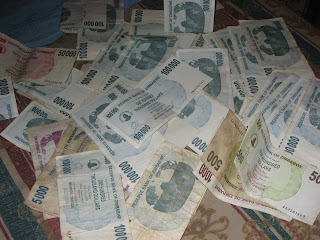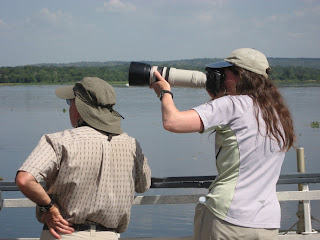It's 1:30AM and the air is crisp. I'm roused by my Dutch friend. Time to go. My eyelids are heavy and my back full of kinks after two hours of sleeping on the ferry's wooden deck.
We gather our packs, and I lead a procession of 12 down the stairs to the life raft. There is a touch of pandemonium as we push and shove with the locals to disembark, elbows wielded. A second raft has arrived especially for us, and we tiptoe across sacks of corn and even human heads in order to reach it. By the time we're all seated, the poor boat is nearly submerged.
We push off. Absolute silence save for the soft sweeping of a paddle through the still water. All eyes point to the sky and its conflagration of stars.
Chizumulu Island slowly emerges from the blackness. The raft docks at the hostel and we climb out, a group of weary somnambulists with hangdog expressions, desperate for sleep.
Flash forward to dawn. Satiated with rest, we emerge from our beds, anxious to view
Chizumulu in the day's light. It is stunning; a small island in the middle of Lake Malawi, near the Mozambican shore. The hostel looks like a pricey tourist resort, though we are only paying $5 for the privilege of staying. Everyone wolfs down a breakfast of toast, eggs and coffee.
Chizumulu has no cars, so if you'd care to move about, you have to walk. I set off with the Dutch guy and a South African girl, the three of us keen to explore some of the island's other shores.
The island is small - 8 sq. km. - and there are fewer than 4000 inhabitants. The lifestyle is traditional: men fish and women do practically everything else. It is also sustainable: the lake provides more than enough bounty to feed everyone, and mangoes and maize are indigenous crops.
Tourists are not prevalent here, and as such our presence garners a great deal of attention. Women crane their necks to peer at us as we meander down the sandy trail. Children drop everything and flock to our location, tracing orbits around us like buzzing satellites. The inevitable conversation begins:
"
Mazungu!!!" [white person]
I nod.
"Hey-
loooooo!"
"Hello."
"What's my name?" [they mean what's YOUR name]
"Mike."
"
Mank."
"Mike."
"
Mikk."
"Yes."
"I'm fine!" [they mean HOW ARE YOU]
"I'm fine."
"
Ohhhhkay!"
Words can't describe how much I'll miss these exchanges once I leave Africa. It continues...
"Gimme money."
"No money."
"Gimme pen."
Bless their hearts. I would if I had pens to give away.
"No pen."
"Gimme picture."
This is doable. I reach for my camera, and the children shake with anticipation. African kids are naturally photogenic. They stick their faces to within inches of the lens, and grin brightly while you liberally snap away. Some turn into
troubadors and will pose in the most ridiculous ways, giggling all the while. When the time comes for you to show them the photos, they stare wide-eyed at the
viewscreen, their minds mesmerized by a foreign device that can capture them in a frozen moment. Ansel Adams never took shots this good.
Exhausted from the heat and the local attention, we pause further along the road. I take more photographs, this time of a group of wooden dugout canoes that sit rocking gently in the waves that lap against the shore. My friends recharge themselves with Pineapple
Fantas and another island staple: popcorn, purchased from a fat lady sitting under a tree.
On the third day, we hire a small boat to carry us over to
Likoma Island -
Chizumulu's bigger sister. Every boat on Lake Malawi seems doomed to sink eventually - you only hope that you won't be there to bear witness to the occasion. The serenity of the bay is misleading, and once we eclipse the point, the water becomes turbulent. Night is falling. An electrical storm looms in the distance, lighting up the Mozambican coast with its intense flashes. The waves lash against the hull, and once again we plunge into silence, until two of the English guys elect to lift our spirits by belting out tone-deaf renditions of a selection of sea chanteys. History repeats itself as we rock up in a hostel that is blanketed in darkness.
Another island, another walkabout. My friend Rachael has an eye infection, so I accompany her over the hills and along the path to the village on the other side. Being
Mazungus, we don't wait long to see the doctor. Malawians treat foreigners with reverence, and we are ushered to the front of the queue.
That taken care of, we take a stroll up a hill to the local cathedral. It is the 3rd biggest cathedral in East Africa. It is ornate; not made of stone like its European counterparts, but of wood. Like most cathedrals, its antiquity evokes an essence of spirituality. The shrill of the village disappears the instant you enter, and is replaced by a silence so thick you could cut it. God's presence?
Serenity abandons us the moment we leave, as a group of schoolchildren zero in on us. I soon have four tiny African hands gripping each of my arms. One of the kids, a shy boy of about 4, wears a t-shirt with
Tigger on the front. I suppose he has no idea who
Tigger is.
The children have decided to escort us back to the hostel. It is a 45-minute hike through rocky hills, and many of them have no shoes. The matriarch of the group is a 15-year-old girl named Catherine, who hands my friend her umbrella to protect us from the sun. She then leads the rest of the group in a series of gospel tunes. The voices are as bright as I've ever heard. Rachael and I attempt to teach them "If You're Happy and You Know It", but to no avail: they are familiar with the tune, and interject almost
immediately with their own version in
Chichewa. It's funny how great the song sounds in a Bantu language. I bloody hate the English one.
We come to the top of the final descent that takes us back to the hostel. The children insist on going the entire distance. I am hobbling slightly, the result of having sliced my foot open on a shell the previous night. I hesitate as I step across a slippery gap, and a young girl, her feet throbbing from the walk, extends her hand to guide me over. I grin sheepishly. I'm wearing hiking boots.
Time to return to
Nkhata Bay. The Rugby World Cup Final dictates your schedule when you're travelling with 7 English people. The boat to the mainland isn't running that week, but that's nothing a little hard currency can't fix. The initial price is extortionate, but we cut it to 10% by allowing locals to travel with us. The boat owner is also
Likoma's only EMT, so we are driven from the hostel to the port in an ambulance. We look at the ship, and I imagine that the average Chinese stowaway would turn his nose at it in the interest of personal safety. But there is a rugby game to be seen and we
clamber aboard.
It's nearly 8 hours on when
Nkhata's lights first come into view. We are on schedule and the mood is good. Suddenly, the boat begins to veer away from the town, towards some unlit stretch of coast further to the South. A bunch of locals have convinced the captain to drop them off at a different village first. We object - an
unforeseen port call would make us late for kickoff. My friend Hugo, a big
ol' Yorkshire boy, gets into an animated discussion with the captain. The boat turns back to
Nkhata. There is an uproar. Teeth are bared, and for the next 10 minutes it seems as if there will be a brawl. Shouts in
Chichewa are matched by venomous threats in
Mazungu, myself spitting verbal
unpleasantries about some guy's mother in my French-Canadian tongue.
Cooler heads prevail though, and soon we are drifting slowly up to the gangplank at the
Mayoka Village Hostel in
Nkhata Bay. It was Happy Hour at the bar, and to the patrons at the top of the stairs, it must have seemed like the
Amistad was arriving. Shirtless, and with my cowboy hat and rucksack, I climbed up the stairs with conviction, my mind sensing the prickle of many incredulous stares.
"
Muli bwanji?" I say.
Chichewa for HOW ARE YOU.
"
Ndiri bwino" comes the collective reply. GOOD, AND YOU?
I casually walked to the bar and ordered a beer.
It was the best entrance I've made in my entire life.















